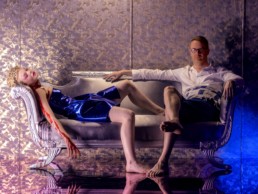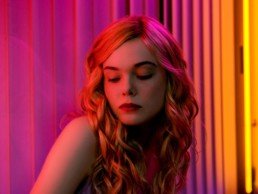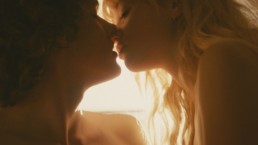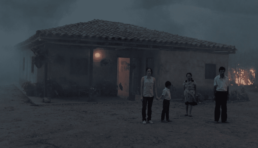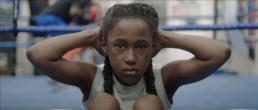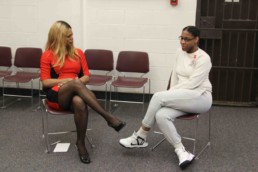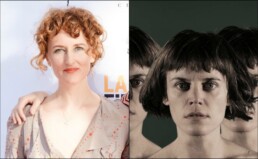'My Love, Don't Cross That River,' Defines the Term 'Soul Mate' But Comes at a Cost
I have a soft spot for a couple of things…dogs and elderly people. So I was immediately drawn to Moyoung Jin's documentary "My Love, Don't Cross That River," a Korean independent film which portrays the relationship of one couple after 76 years of marital bliss. What starts out as a beautiful story about a true love that defines the term "soul mate,” suddenly had me feeling quite guilty; for it's hard not to feel as if this fragile couple is being exploited during the most life-altering moment of their lives. But more on that later.
The film opens with a shot of a woman sitting in the falling snow, her back towards the camera. She is crying, alone. A clear foreshadowing of things to come, we then flashback to about a year earlier and we are introduced to Byong-man Jo and Gye-yeul Kang, nicknamed the "100-year-old Lovebirds." They radiate joy, playfully and slowly, tossing leaves in the air and at each other. He sings her songs, she calls him hubby. They are the picture of what true love looks like.
We learn more about the couple, their lifestyle, and history. They live in a remote village in Korea, next to a running river. She gave birth to 12 children and lost 6 of them due to the war, measles, and other tragic circumstances. They met when she was 14, and he was 19 as part of an arranged marriage. Initially appalled by the age difference, she did not even hug him until she was 17-years-old. Overcome by emotion, she explains that he waited for her to feel comfortable, something that she has been grateful for ever since. Now, they cannot fall asleep without holding each other's hand.
His health declines very rapidly, which is captured on camera. The coughing and wheezing get worse, and all we can do is watch helplessly as he suffers. A man who was once so playful and fun loving literally turns into a walking skeleton, barely able to mutter a word. The couple is put through even more difficult circumstances when one of their two dogs passes away. Director Moyoung Jin’s choice to show the dead dog in the arms of the dying man changes what could have been seen as a poetic, circle of life moment, to one that just feels sad.
There are moments early on in the film where I found myself choking back tears, especially during the tender touches to her face as they fall asleep. However, the more his health declines, the more Moyoung Jin seems to fixate on her breaking heart, almost capitalizing on the cinematic draw that it will bring. I found this not only difficult to watch but incredibly sad to see one family's private moments of anguish become so public.
What started out as a celebration of humanity, unfortunately, became what felt like an exploitation of a fragile woman's grieving process. This isn't just my "soft spot" talking either (although I did have to witness both a dog and an elderly person die on screen). To me, this brings up the bigger question of morality in filmmaking. I'm not saying that Moyoung Jin should have censored or in any way omitted the fact that death is, of course, part of life, but the way it is portrayed just didn’t sit well with me. Focusing on pain and loss above the beauty of what created this relationship,"My Love, Don't Cross That River" leaves viewers feeling blue.
"My Love, Don't Cross That River" is not rated. Now playing in select theaters.
Nicolas Winding Refn, Elle Fanning on How Witnessing Death Lead to Inspiration in 'The Neon Demon' [LISTEN]
[soundcloud url="https://api.soundcloud.com/tracks/270543924" params="color=ff5500&auto_play=false&hide_related=false&show_comments=true&show_user=true&show_reposts=false" width="100%" height="166" iframe="true" /]
Soon after I take my seat in the front row for "The Neon Demon" press day at the SLS Hotel in Beverly Hills, Bella Heathcote, Christina Hendricks, Jena Malone, Elle Fanning and Nicolas Winding Refn make their way to their chairs. Having just premiered the film at Hollywood Forever Cemetery the night before (with a crazy after party consisting of a Q & A with Ryan Gosling and eyeball cake pops), everyone seemed so energized, especially Elle Fanning who told us proudly, she is "officially" a high school graduate. Our conversation is interesting, to say the least; director Nicolas Winding Refn talks about seeing a man die during filming, Jena Malone talks women vs women stereotypes, and Elle talks about finally feeling free to create on set for the first time. We begin:
Where was the idea for "The Neon Demon" birthed from? On some level, is it parental anxiety because you have daughters and this is something they could encounter in L.A.?
Nicolas Winding Refn: Sure, being a father to two daughters is... interesting, especially now that my eldest is 13. I can see how technology [affects her] and how she reacts to it. The origin of the film was actually a few years ago. I woke up one morning and realized that I wasn't born beautiful, but my wife was. I wondered what it would be like to be more beautiful. There's also this fantasy that I think every man has, being desired for one specific reason, which is beauty. Of course, it's very superficial. I wanted to make this a horror film. I didn't want to educate or make a political statement on beauty.
Elle, can you talk about playing Jesse and embracing her nuances?
Elle Fanning: The funny thing is, is that I think my character was the most evil. I thought of her like Dorothy coming to Oz, but she is the evil one. Jesse is the toxic poison that corrupts everybody else. I like this film because, yes, it's like a classic "A Star is Born," a little girl comes to a big city, but she has a plan the whole time. She uses her youth and innocence as a mask to disguise it. We also filmed in chronological order, so things were changing all the time. I really trusted everyone in the entire cast, we were all in this together. I'd get to set and Nic would ask me what I wanted to do. I never felt so free on a set to really just create things.
"I thought of [Jesse] like Dorothy coming to Oz, but she is the evil one." -Elle Fanning
Have any of you ever felt exploited like Jesse being an actress in L.A.?
Jena Malone: I would almost turn it around and say it's not just about Los Angeles, I would ask every woman and man in this room if you've ever felt exploited, or undersold by your own beauty, or devalued because of your facial structure. I don't think it's just "Los Angeles" or the "fashion industry," I think this is something all of society is being affected by.
What about working with other young women in the industry, do you feel pressure or support from your female peers?
Bella Heathcote: I feel like I'm being helped more and more [by women]. Although there is one girl specifically who I based Gigi off of, she's the kind of girl who will do anything she can to destabilize you in any situation, professional or otherwise, to make herself feel better. But the last film I did was with all girls and I was a bit nervous going in because I didn't know what to expect but it was a really supportive vibe, a beautiful sisterhood.
JM: I think the stereotype of women battling [each other] in the workplace is a stereotype I was fed when I was a child, but I've never actually seen it. Except for high school. I think that women coming together in a group and creating something will instantly feel that it's something special. I think that energy alone is healing.
"There is one girl specifically who I based Gigi off of, she's the kind of girl who will do anything she can to destabilize you in any situation..." -Bella Heathcote
Has your sister (Dakota) influenced you as an actor?
EF: Yeah, my sister started acting before I did so she paved the way in that sense, little sister wants to do what the big sister does and try it out. But we're very separate with our scripts and things. She actually saw "The Neon Demon" for the first time last night, she loved it. One of the scenes made her sick, but I was like, "Good!"
(Laughter)
"The Neon Demon" is like a rollercoaster ride, thrilling and unpredictable. I'm wondering, what was your favorite scene to shoot?
NWR: When you find something new or you did something you didn't know was going to happen, you get pumped. I remember when we were doing the runway show, I had gone to Musso & Frank because we were shooting there the following day. I had just dropped my daughter off at school in the morning and arrived to look at the location, and when I went into the parking lot someone had been stabbed. There was a guy holding his wound and screaming for help. He was all alone. I hurried over to this poor man who was lying on the floor, blood was just gushing out. I had (a jacket) on, but took it off because we needed something to put pressure on the wound. Unfortunately, the ambulance arrived too late and he died. The parking lot turned into a crime scene and we weren't allowed to leave. I was supposed to be shooting in the valley, and I was like, "Oh my God, how are we going to do this?" The insurance company wouldn't care if I was stuck at a murder crime scene. As I was standing around, answering questions, I suddenly got an amazing idea. And that idea changed the film. So even though it was such a horrifying experience, I had never seen anyone die before, it gave me one of the best ideas for the movie.
"So even though it was such a horrifying experience, I had never seen anyone die before, it gave me one of the best ideas for the movie." -Nicolas Winding Refn
What was the editorial process like?
NWR: I've worked with my editor Matthew Newman for the last 5 movies. Matt cuts the movie at night at my pool house, so I can come and watch cuts. If Matt ever says we need this or that, like an extra close up of something, I always listen. It great to have those few people around you on the technical side who you know all share the same vision.
[Music composer] Cliff Martinez became the third part of the team on "Drive," and he is the first person to see the thing. We talk about the music, and he always has 100 questions. Then he goes away in his laboratory and comes back with this music that just makes the movies better.
The film is very quiet, not a lot of extraneous noise.
NWR: I love silence because silence is the loudest sound in the room. The first time you really pay attention to a sound is when you don't hear anything. At first, it's very uncomfortable because we're not used to silence, we're used to noise and definition of noise. Not talking is actually scarier than talking.
Christina Hendricks: I saw the film for the first time last night and I loved it. I found that with the silence or just a beautiful image that Nic had us sit in for a bit, you found yourself having to confront your relationship with what was going on [on screen]. Elle played Jesse so beautifully, she's supposed to be so innocent but then we see at the end of a scene she gives this little smirk of enjoying being adored so much, the narcissistic and dangerous side of her comes out. In those quiet moments, I found myself thinking how beautiful, sexual, ridiculous, and goofy taking fashion to those extremes can be. I liked that I got to sit in those moments and have to feel those things.
"I found myself thinking how beautiful, sexual, ridiculous, and goofy taking fashion to those extremes can be." -Christina Hendricks
How do you feel about living in Los Angeles?
EF: I was pretty young when I moved to L.A. from Georgia, but it's definitely very different from the small town my family and I grew up in. L.A.'s my home, I go to school there– well not anymore, I just graduated two days ago...
Congratulations!
NWR: (jokingly) Fuck school.
EF: Hahaha!
For our review of "The Neon Demon," click here
Beauty is, Literally, in the Eye of the Beholder in Stylish, Hypnotic 'The Neon Demon'
After the credits roll and the lights come up, the older man sitting next to me says "So what's for dinner?" and had we not just seen "The Neon Demon,” I may have said something like spaghetti and meatballs, but all I can muster up now is a slight chuckle while trying not be sick.
Days later, I find that I'm still trying to ‘digest’ the visual rollercoaster that is "The Neon Demon." Elle Fanning plays Jesse, a small town girl with big dreams of making it as a top model in Los Angeles. Her doe-eyed innocence and all around aura seem that of a porcelain doll, and at sixteen, she is quickly becoming the industry's next "It Girl.”
Her sudden rise to fame doesn't come without dangerous consequences. Jesse befriends the well-intentioned makeup artist Ruby (Jena Malone) but is met with thinly veiled jealousy by the other genetically gifted blonde beauties, Gigi (Bella Heathcote) and Sarah (Abbey Lee). Playing into the cattiness of the fashion world and its unattainable ideal of beauty, the girls' relationship with Jesse is a mix between "Heathers" meets "Mean Girls,” but far darker. We're talking necrophilia, physical torture, and other bizarre abstractions.
At one point, Jesse is pressured by the famed yet creepy photographer Jack (Desmond Harrington) to strip naked while he rubs gold paint over her body in the name of “art." Sure it is evocative, but also quite disturbing. Not only is she underage, but instructed by her agent Jan– played by Christina Hendricks– to tell everyone she is 19 “because 18 is too on the nose.” She is fragile, literally a blank canvas slowly being stained by the industry and everything it stands for before our very eyes. It is at this point that we see Jesse’s transformation. Humility turns into confidence, that turns into entitlement, and the light that once illuminated her, fades.
Director Nicolas Winding Refn's latest cinematic experience (just saying 'film' seems to downplay his work) is more twisted and bizarre than others in his repertoire. He does again, however, manage to capture in his characters that unique feeling of emptiness within chaos, which made "Drive" and "Only God Forgives" memorable, for better or for worse.
The performances from everyone involved, including Keanu Reeves as a sketchy motel owner and Alessandro Nivola as a major fashion designer, play well against Refn’s aesthetically ambitious vision. As the title suggests, neon hues are present in almost every scene, often a moving gradient like the screensaver of a 95 Macintosh computer. I also feel obligated to mention that there are also multiple scenes with bright, unrelenting flashing lights that may cause seizures (now you've been warned!). And for as much as fashion and beauty are eroticized by the actions of the characters, Natasha Braier’s artfully realistic cinematography adds sophistication and unpredictability to the film.
While visually inspiring, there is not much of a narrative to follow, so those looking for a story in the traditional sense may find this film as vapid as the fashion industry it sartorially mocks. Any attempt to fully critique or even make sense of what is going on in the narrative can cause even more confusion. The result is that the audience just needs to go along for the ride in order to enjoy it. Perhaps this a case of style over substance? But you've got to hand it to Refn, he is certainly far more than a typical “director," he is a creator of cinematic worlds. Although I’m not speaking from experience, one could safely assume that "The Neon Demon" may best be enjoyed on an empty stomach and with some type of hallucinogenic?
'The Neon Demon' is rated R for disturbing violent content, bloody images, graphic nudity, a scene of aberrant sexuality, and language. In theaters on Friday, 6/24.
'Bang Gang' Review: A Sun-Soaked Navigation Through Teenage Sexuality
Capturing the laissez-faire attitude toward unbridled sexuality that we have come to expect from the French, director Eva Husson creates a sensual and sun-soaked, coming-of-age drama in her directorial debut, "Bang Gang (A Modern Love Story)." Unpolished and authentic, "Bang Gang" centers around a group of high school friends living in a wealthy coastal suburb of France with a lack of parental supervision, and their individual attempts to navigate through their teenage years while dealing with sexuality and the consequential messiness of love and heartbreak.
The film opens with a long one-take tracking shot that leads from outside into a large house where upwards of 40 teenagers are throwing a party. In one room, teens are hooking up with each other, fully naked, while others are clothed, playing video games,and oblivious to what's going on right down the hall. Rewind a couple of months (as the title card reads 'Two Months Earlier') and we meet our protagonists George (Marilyn Lima) and Laetitia (Daisy Broom).
George is every Pinterest user’s dream girl, her un-kept, long blonde hair compliments her lightly freckled face and slender physique. Laetitia, on the other hand, is overshadowed by George's beauty, but that doesn't seem to bother either girl. One afternoon while hanging out with a couple of guys from school, a bit of sweet talking and peer pressure leads to Alex (Finnegan Oldfield) and George having sex while Laetitia and Nikita (Fred Hotier) just watch.
Bang Gang (A Modern Love Story) - Official trailer from Films Distribution on Vimeo.
Following an afternoon of enjoyment, the teens decide to include others in their fun. George initiates a game of spin the bottle, which ends up being just an excuse to hook up with each other, and soon the sex parties grow in numbers. Multiple teenagers engage in various sexual activities with each other, recording their trysts to watch later. It seems everyone is interested in the Bang Gang except for Gabriel (Lorenzo Lefèbvre), Laetitia's introverted neighbor who would rather create electronic music at home than participate.
Drama ensues once George realizes she's developed feelings for her hookup buddy Alex, and after seeing him get close to Laetitia, she attempts to get revenge by hooking up with as many boys as she can. Things get complicated once more when she falls in love with Gabriel after spending the afternoon together at a Bang Gang. They may be sex-driven, but these teens engage with the fantasy of finding real love and not just to feel pleasure as director Eva Husson gives her characters an innocence in their confusion between love and sex.
"Bang Gang" is more than just attractive French teenagers lounging half-naked and having sex with each other for shock and awe. It is a bold and daring statement about modern teenage culture and self-expression. Drawing comparisons to Larry Clark's "Kids" and Sofia Coppola's "Virgin Suicides", "Bang Gang" is daringly original. Full frontal nudity, both male and female, makes up a majority of scenes. The synth-pop score also gives off the feeling of a Nicolas Winding Refn film in both its impending doom and dreaminess.
"Bang Gang" is definitely not a prude's movie, one should stay away from making this the choice for a family outing. It is, however, a stunning and realistic portrait of finding oneself between the abyss of childhood and adulthood with a future that doesn't necessarily end in happily ever after.
'Bang Gang' is not rated. Opens in select theaters today, 6/17.
'Land and Shade' is a Sensory-Driven Film About Working Class Hardships
This review previously ran on November 12, 2015 during the AFI Film Festival
After being awarded the "Camera d'Or" prize at the 2015 Cannes Film Festival, "Land and Shade" had its US premiere at the AFI FEST this week and was just honored with the festival's highest award, "The New Auteurs Grand Jury Award". The minimalism in the photography of "Land and Shade" speaks volumes; with beautiful sweeping long takes of one family's Columbian home and the hardships they experience to barely make a living, director César Augusto Acevedo has created not just a moving film, but a transcendent viewing experience.
When the patriarch of the family, Gerardo, falls ill, his estranged father, Alfonso, reunites with his ailing son and the family he hasn't seen in seventeen years to offer his help. Gerardo, his wife, their young son, and his mother, Alfonso's ex-wife, live in a rundown home in the Colombian countryside where they work as sugarcane farmers. It's unveiled that Alfonso left the life he knew to escape the unbearable living conditions his family still faces today- the same conditions that caused Gerardo's illness- and so his return home is met with some hesitancy at first, but his budding relationship with his young grandson proves his well-intentions and gives way for the rest of the family to welcome him back into their lives once again.
What Acevedo does so well is he explores a moment in the mundane life of this family with such an attentive and sensitive eye, much to the credit of his cinematographer, Mateo Guzman. Nothing overly "exciting" happens in the film per se, but the attention to detail he achieves onscreen will resonate with those who sympathize with the struggles of the working class. Battling harsh working conditions, like falling ash from the continuous fires that burn as part of the harvesting process, the simple wiping down of dusty ash from a growing plant leaf is potently symbolic.
With a specific cinematic style comprised of long takes and vivid and vibrant aesthetics, "Land and Shade" is a sensory-driven film about the stark reality of one salt of the earth, working class family, and their indelible perseverance for a better life. Remarkably, "Land and Shade" is Acevedo's directorial debut and I know I speak for the audience at large when I say that I anticipate big things in his future. His name is definitely one to remember.
'Land and Shade' is not rated. Opens in select theaters Friday, 6/17.
'The Fits' Proves That Creativity in the Film Industry is Not Dead
In 2015, director Anna Rose Holmer was declared one of Filmmaker Magazine's "25 New Faces of Independent Film," and after watching her feature directorial debut, "The Fits," it's obvious to see why. Holmer doesn't only manage to capture the entire world of her story in a brisk 70-minute running time, she has the ability to evoke palpable emotion without the use of much dialogue, which culminates in a chills-inducing final scene (as this reviewer can attest to).
Eleven-year-old Toni (newcomer Royalty Hightower), a young girl of color, stands out from the rest of the youths around her. In a recreational boxing gym, with long boxer braids hanging off of her tiny frame, Toni stands apart from the rest of the boys, working through a set of sit-ups as her protective brother Jermaine (Da'Sean Minor) practices jabs.
Yet she also stands out from the other girls, a group of whom spend time just down the hall from the gym as part of a hip-hop dance troupe, which is where Toni, after hearing the transfixing reverb of deep bass music, is drawn to and sees an energetic, hypnotizing dance battle between them. Without telling Jermaine, Toni joins the girls, thrusting herself into a new world of forging female friendships and self-discovery in adulthood.
Things turn strange when some of the older girls on the team begin experiencing unexplained "fits," including loss of breath, convulsions, and passing out. This puts the fear of the unknown in all of the girls, Toni and her new friend Beezy (Alexis Neblett) can only explain it as "boyfriend disease." This is where the film turns unexpectedly dark, the score begins to reflect a psychological thriller and everyone, the audience included, is on the edge of our seat trying to figure out just what is wrong and how to stop it.
What captivated audiences in Sia's "Chandelier" music video has the potential to do the same thing here, the dancing mixed with the innocence of the girls and the art house feel of the film is a winning combination. Royalty Hightower puts on a tour de force performance, she carries the film on her back so effortlessly. Her strengths don't just come out in the pull ups she does, they are hidden within her face and explode during high-intensity scenes. Remember her name, Royalty Hightower is just getting started.
While she may be a first time director, Holmer definitely has behind the camera experience. Her past work in the industry includes camera department on films such as "Twilight" and "Tiny Furniture," two very different films tonally, but both standouts to me personally. It is no wonder then that some of the film's strongest qualities are the beautifully composed shots; from ethereal one takes of Toni practicing her dance routine outside on the stairs to the energized repetition of the group's call and answer moves, Holmer makes every frame look like a work of art. Not a lot of dialogue is spoken, nor does it need to be, because the visuals easily carry the film to great heights.
"The Fits" is equal parts dramatic and surreal, and on a larger scale, proves that creativity in the film industry is not dead. After seeing this film, how can one even stand the thought of another sequel or superhero blockbuster? If directors like Holmer are just given a chance, I believe the whole industry would be changed for the better. "The Fits" is an astounding job all around, stylistically composed with the substance and heart to back it up.
"The Fits" is not rated. Opens in select theatres tomorrow, 6/10.
Documentary 'Free CeCe!' Shows Fight for Justice Within LGBTQ Community
It's been a little over 5 years to the day (June 5, 2011) since the altercation took place. Walking with a group of friends and minding her own business, 23-year-old Chrishaun Reed “CeCe” McDonald was brutally attacked outside of a bar. In self-defense, she fatally stabbed her attacker, Dean Schmitz, in the heart. While a situation like this one may not typically warrant a full-length documentary, what makes CeCe's case stand out is the fact that she is a young trans woman of color and the way she was treated throughout her court case proves that the United States still has a long way to go in the fight for equality in the LGBTQ community as documented in the film "Free Cece!"
In what was perceived as a blatant hate crime to many, the judicial system didn't reflect the same opinions and therefore treated CeCe more like a perpetrator than a victim. She was ordered to serve time in a men's prison, a dangerous liability for any trans woman, after spending over three months in solitary confinement. This injustice inspired activists to rally to her defense and, with the help of acclaimed "Orange is the New Black" actress Laverne Cox, friends and family fought to bring awareness to Cece and to the larger issue of justice for all, despite one's gender identity, race, or ethnicity.
"Free CeCe!" is not only timely in a political sense, with the gender neutral bathrooms still a hot topic of conversation, but the style in which director Jacqueline Gares captures CeCe's story is reminiscent of the popular podcast Serial in which one is left to question the ruling of a convicted person in general. The majority of the film doesn't spend too much time talking specifically about the case, but is dedicated to CeCe's life after prison and how she has become a figurehead for trans women everywhere. This documentary and the work that both Laverne and CeCe have put into educating others is truly an inspiring watch. CeCe had struggled with identity issues throughout her childhood and grew up thinking that violence and aggression from others was to be expected, but now she proves that it is possible to overcome persecution. Even though at times, the hatred seems overwhelming, her story reminds us that if her story and stories like hers continue to be part of the conversation, it can and does get better.
Director Amber Sealey and Gemma Brockis of 'No Light and No Land Anywhere' Talk Working With a Predominantly Female Cast and Crew [LISTEN]
[soundcloud url="https://api.soundcloud.com/tracks/268185673" params="color=ff5500&auto_play=false&hide_related=false&show_comments=true&show_user=true&show_reposts=false" width="100%" height="166" iframe="true" /]
I meet Amber Sealey and Gemma Brockis at the Culver Hotel a day after the world premiere of their film, "No Light and No Land Anywhere," showing at the 2016 L.A. Film Festival. These two women radiate confidence and creativity, and what I felt in that moment in person translates beautifully in their film. During our conversation, we talk about the difference for artists working in London vs Los Angeles, a majority of their cast and crew being made up of women, and the strong artists that inspire them. We begin:
When was the first time you met, and what drew you to each other?
Gemma Brockis: We met back in London, at an art space/museum.
Amber Sealey: We were 21 and we were working there. [The space] had these 21-year-old kids as ushers, basically supposed to be guarding this art, but instead we would just give each other backrubs!
(Laughter)
That's so funny–when I was in middle school my best friend and I would give each other hand massages, so I get it!
AS: We still do that. I'm always like, 'Can you please give me a back rub Gemma.'
GB: Haha! I also had a theater company, we were in a show together and became really good friends. We really wanted to do something together again, at least I did anyway! I didn't care what it was I just wanted to work with Amber!
"Here, in Hollywood particularly, there is this emphasis on fame and blockbusters. A lot of Brits I know that are doing really well are kind of embarrassed, 'Oh shit, I'm famous...that's really embarrassing.'" –Amber Sealey

What would you say is the difference between being an artist in LA vs London?
AS: I worked in London for seven years in what's called devised theater, although I did a lot of television, a little bit of film, and a lot of voice-over work over there too. I think the difference is, culturally, Britain's government supports the arts. There's just a lot more freedom to be flexible and try new things. There is not this pressure to succeed in the way we have it here.
Here, in Hollywood particularly, there is this emphasis on fame and blockbusters. A lot of Brits I know that are doing really well are kind of embarrassed, 'Oh shit, I'm famous...that's really embarrassing.' Here in Los Angeles, there are a lot of people where that's their only goal. Obviously, when you have a little bit of fame, you get a little bit more power and can get a little bit more money, so it does help you make the art you want to make. So I think people's heart desires come from a worthy place, but I think in LA it's easy to get really distracted by the celebrity side.
Let's talk "No Light and No Land Anywhere"; how was the script-writing process?
AS: Gemma's father died when she was young, and we are good friends, so over the course of our 20-year friendship we've had conversations. I know Gemma has mentioned what her life would've been like had her dad been around in her teens, so I took that teeny grain of an idea and ran with it.
GB: I had some involvement, but it was really on the floor acting more than the idea of the film or shaping the story.
"[Miranda July] is just a great friend and someone who really likes supporting art that she believes is worthy..." –Amber Sealey

Miranda July's name is attached to the film, what was her involvement?
AS: Miranda and I met in college, we were 18 and met working in theater. I can't even remember how I officially asked her to be apart of it, but she's just a great friend and someone who really likes supporting art that she believes is worthy and wants to help shine a brighter spotlight on.
I read a statistic that 83% of your cast and crew were women, was that intentional?
AS: It totally was, for sure. How can we miss the statistics that are coming out about women [in the industry], it's like–wow, we have to change that. We're still climbing up that hill, we're not quite at the top yet, but I think everybody has to do their part to think outside of the box on how to be more inclusive. We had an all-female camera crew. We had one male camera assistant that came on for one or two days.
GB: He was alright.. haha!
AS: I told him he couldn't speak!
(Laughter)
Did you entrust your cinematographer to capture the look and feel of LA, or did you have shots in mind prior to shooting?
AS: I actually framed the [B-roll] shots, sometimes I shot them! I was very specific about that. We don't have a shot list, but we'd have a discussion about what we want and our cinematographer Katie [Goldschmidt] and I would get it together.
"I think that's one of the great things about LA; there is so much beauty everywhere. I'm a huge fan of freeway shots, I think they're so beautiful. Then you've got gorgeous mountain ranges... I mean, it's so easy to just grab a camera and go out and shoot." –Amber Sealey
The camerawork is one of my favorite things about the film. It made everything feel so alive.
The Hollywood Boulevard stuff was very guerrilla style–I mean, as much as you can with an ARRI AMIRA camera. It's pretty big! I think that's one of the great things about LA, there is so much beauty everywhere. I'm a huge fan of freeway shots, I think they're so beautiful. Then you've got gorgeous mountain ranges... I mean, it's so easy to just grab a camera and go out and shoot.
The elderly people in the film were so great! Were they all actors?
AS: The person that plays Lexi's father is my real life dad. I was born in England and left when I was three, so I knew that my dad had the perfect accent of a British person who had been living in the United States for like, 37 years. The very old people who were in their 90s, that was a mix. I did put out a casting call. A friend of mine who I had known, that has nothing to do with film, wrote me saying 'My mother-in-law is 92 and she's always wanted to be an actor.' Apparently she had this fantasy life where she always wanted to study it but her parents refused to let her study it in college. So I drove to meet Phyllis Fisher at a Coco's diner, she's the one who goes up the stairs really fast in the film. She's such a character! What's actually really sad is that two of them have passed away since we shot the movie. Phyllis's husband Ben passed, he was over 90, and the guy who tells her to go to the beach, Bertram, also passed away. So it was bittersweet having the screening last night because their families were there.
"I love women that make weird, strong films." –Amber Sealey
So many aspects of this film are inspiring, including yourselves. Who do you each look to for inspiration, film-related or otherwise?
GB: Oh gosh...
AS: Well, me–right Gemma?
GB: Haha! It's really strange, my boyfriend actually asked me this question yesterday, and in all honesty, I would say a lot of the time it is my friends. I know that sounds like an easy answer,0 but it's true. A lot of the time, there are women I admire and want to work with and make them my friends. They are the people who inspire me. Amber is one of them.
AS: I agree, I think there is something really special about friends. You can see their process because you know them and they can talk about their work with you in a way that can inspire you more because it's not this crazy, unattainable thing. There are so many female filmmakers that I admire too: Lynne Ramsay, Kelly Reichardt, Miranda July, Andrea Arnold, Jane Campion. I love women that make weird, strong films.

